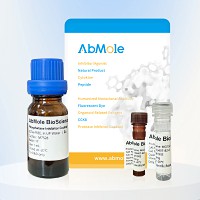
USP14 belongs to the ubiquitin-specific processing (USP) family which is a deubiquitinating enzyme (DUB) with His and Cys domains. USP14 acts also as a physiological inhibitor of endoplasmic reticulum-associated degradation (ERAD) under the non-stressed condition by inhibiting the degradation of unfolded endoplasmic reticulum proteins via interaction with ERN1. In addition, USP14 is indispensable for synaptic development and function at neuromuscular junctions, required for the degradation of the chemokine receptor CXCR4 which is critical for CXCL12-induced cell chemotaxis.
Recombinant Human USP14 expressed the target gene encoding Asp91-Gln494 with a 6His tag at the N-terminus.
Accession: P54578
Endotoxin < 1 EU/µg
Apparent Molecular Weight: 52 KDa, reducing conditions
Supplied as a 0.2 μm filtered solution of 20mM Tris-HCl, 100mM NaCl, 20% Glycerol, pH 8.0.
The product is shipped on dry ice packs. Upon receipt, store it immediately at the temperature listed below.
| Form | Solution |
| Storage | Store at ≤ -70°C, stable for 6 months after receipt. Please minimize freeze-thaw cycles. |
| Species | Mouse | Rat | Rabbit | Guinea pig | Hamster | Dog |
| Weight (kg) | 0.02 | 0.15 | 1.8 | 0.4 | 0.08 | 10 |
| Body Surface Area (m2) | 0.007 | 0.025 | 0.15 | 0.05 | 0.02 | 0.5 |
| Km factor | 3 | 6 | 12 | 8 | 5 | 20 |
| Animal A (mg/kg) = Animal B (mg/kg) multiplied by | Animal B Km |
| Animal A Km |
For example, to modify the dose of Compound A used for a mouse (20 mg/kg) to a dose based on the BSA for a rat, multiply 20 mg/kg by the Km factor for a mouse and then divide by the Km factor for a rat. This calculation results in a rat equivalent dose for Compound A of 10 mg/kg.
| Related Recombinant Proteins Products |
|---|
| Recombinant Human Serpin A12 (E.coli, N-GST)
Vaspin (Visceral Adipose-Specific SERPIN) is a newly described adipokine. Vaspin is also a unique insulin sensitizing adipocytokine in obesity. |
| Recombinant Human B2M Protein (Mammalian, C-6His)
β-2-Microglobulin (B2M) is a secreted protein with 1 Ig-like C1-type (immunoglobulin-like) domain which belongs to the beta-2-microglobulin family. B2M may adopt the fibrillar configuration of amyloid in certain pathologic states. |
| Recombinant Mouse E-Selectin/CD62E Protein (HEK293)
E-selectin, also known as endothelial leukocyte adhesion molecule-1 (ELAM-1) and CD62E, is an inducible adhesion molecule that is expressed on the surfaces of stimulated vascular endothelial cells and is sometimes involved in cancer cell metastasis. |
| Recombinant Human DPP4/CD26 (Mammalian, C-6His)
DPP4/CD26 is a signal-anchor for type II membrane protein that belongs to the peptidase S9B family. DPP4/CD26 acts as a positive regulator of T-cell coactivation, by binding at least ADA, CAV1, IGF2R, and PTPRC. It’s binding to CAV1 and CARD11 induces T-cell proliferation and NF-kappa-B activation in a T-cell receptor/CD3-dependent manner. |
| Recombinant Human EpCAM/Trop-1 (Mammalian, C-Fc)
Epithelial Cell Adhesion Molecule (EpCAM) is a signal type I transmembrane glycoprotein. EpCAM plays a role in embryonic stem cells proliferation and differentiation; it up-regulates the expression of FABP5, MYC and Cyclin A and Cyclin E. It is highly and selectively expressed by undifferentiated embryonic stem cells. |


Products are for research use only. Not for human use. We do not sell to patients.
© Copyright 2010-2023 AbMole BioScience. All Rights Reserved.
